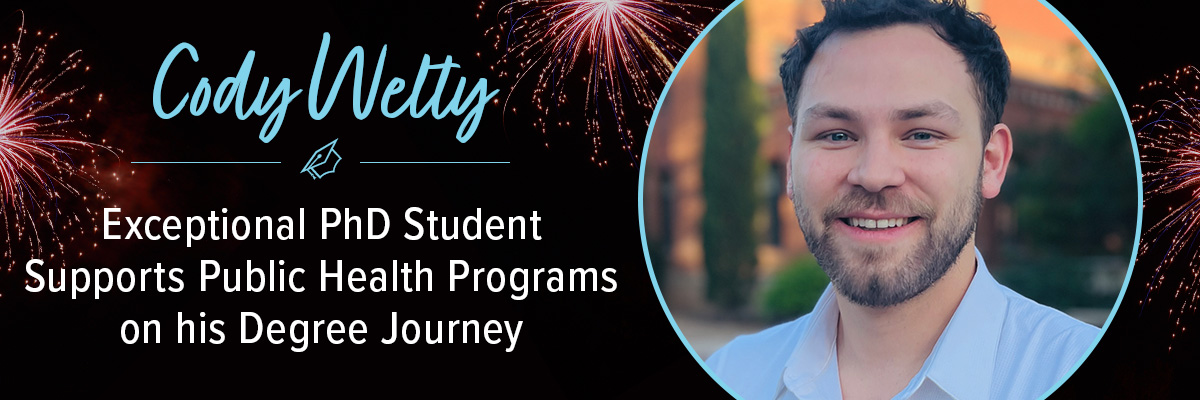
Cody Welty graduated this spring with his MSPH and PhD in Health Behavior and Health Promotion. He brought a commitment to promoting adolescent mental health and suicide prevention to his educational journey and contributed to many projects and events within the college, even as he gained knowledge and experience through a range of jobs and internships. He currently works as the Program Manager for the Arizona Health Navigators at the Arizona Center for Rural Health. For his dedication to public health and the college community, Cody received the graduate 2024 Student Life Award.
2024 Graduating Student Profiles:
Cody Welty
MSPH and PhD in Health Behavior and Health Promotion

I found that one of the strengths of the public health program was the flexibility provided so that students can make their own path to success.
Cody Welty graduated this spring with his MSPH and PhD in Health Behavior and Health Promotion. He brought a commitment to promoting adolescent mental health and suicide prevention to his educational journey and contributed to many projects and events within the college, even as he gained knowledge and experience through a range of jobs and internships. He currently works as the Program Manager for the Arizona Health Navigators program at the Arizona Center for Rural Health. For his dedication to public health and the college community, Cody received the graduate 2024 Student Life Award.
Early on, Cody was eager to get involved with his new college and he supported the college’s annual Public Health Poster Forum for research as the Judge Coordinator for the Forum, then updated the Forum’s judging process with the use of Qualtrics, and continued to stay involved in the planning and judging process. Additionally, Cody volunteered at several new student orientations in varied roles, and his naturally welcoming personality contributed to his success as a Graduate Public Health Ambassador for the college.
During the COVID pandemic, Cody used his research interest in adolescent mental wellness to assist in the creation of tools to support teens, including the video guide he narrated, How Do I Get Through This? A Guide for Teens, and Parents of Teens, During COVID-19 Stay-At-Home Orders. He has given numerous public presentations on adolescent suicide prevention and substance use, and he brings both passion and expertise to both those topics.
In addition to his coursework and dissertation, Understanding Adolescent Suicidality: Exploration of School Connectedness, Vaping, and Research Barriers, Cody interned at the Substance Abuse and Mental Health Services Administration (SAMHSA) in Washington DC and developed suicide prevention and screening toolkits for pediatric health providers among other projects. He also worked as a Systems Evaluation Contractor for Pima County Health Department to analyze evidence of STD demographic discrepancies in the county. Further, he completed multiple initiatives and projects in collaboration with his mentor, Dr. Patricia Haynes, including a suicide prevention intervention for Tucson firefighters and mentoring three undergraduate honors thesis projects.
Cody’s wide-ranging experience with real-world programs and implementation has expanded his educational journey while at the same time his abilities have benefited mental health programs for many organizations, institutions, schools, communities, and individuals. Already an accomplished public health professional, he will certainly go on become a leader in the field of adolescent mental health field.
For this profile, we asked Cody about what he learned during his PhD degree program at the Zuckerman College of Public Health, and what inspires him about public health work.
Q: What inspired you about the projects and/or programs you worked on? What did you learn?
A: Each project and program I worked on felt unique in its public health impact. I’ve worked in the field of adolescent suicide prevention since I was 17 years old, and I saw there was a large gap in knowledge and mental health services for teens. After working closely with youth, I realized I could make a larger impact on the community through the public health field and initiated my research and doctoral program. I’m proud of what I have accomplished with the Arizona Health Navigators program and my work with SAMHSA and many other projects. Through those experiences I’ve learned that as public health professionals and researchers, we rely on our our teams and community partners for success. Nothing in public health is accomplished individually. Developing relationships with peers and community members is instrumental to finding success on any project.
Q: Did you have a teacher or mentor who especially inspired you? How and why?
A: Absolutely! I worked very closely with my mentor, Dr. Patricia Haynes, over my six years in the program. Dr. Haynes provided guidance to shape my doctoral experience and to prepare me for the career I wanted. She gave detailed, constructive feedback and knew how to push me to help me grow as a student. I am very grateful.
Q: How will your education and experience as a public health student influence your path forward?
A: I was intentional during my time as a public health student and chose opportunities to develop skills that would make me successful in the career I want. I did not desire a career in academia, and so I shaped my experience as a doctoral student to build my skills and experience for government and industry fields. I worked as a manager on multiple grant funded positions, interned over one summer at SAMHSA, and tailored my courses to match my career interests. I found that one of the strengths of the public health program was the flexibility provided so that students can make their own path to success.

